Call Monitoring System Tips for Better Call Center Results

A call monitoring system plays a pivotal role in improving customer service and agent performance. By analyzing key metrics like First Contact Resolution and Customer Satisfaction Score, you can identify areas for enhancement. Effective monitoring drives results, such as a 33% boost in satisfaction and a 42% increase in client retention. It also reduces approval cycles by 20%, enabling agents to focus on meaningful interactions. Tools like Sobot empower your team to achieve operational efficiency, ensuring every call contributes to a superior customer experience.
Understanding Call Monitoring Systems
What Is a Call Monitoring System?
A call monitoring system is a tool that allows you to evaluate and analyze customer interactions in real-time or through recorded calls. It helps you track key metrics like call quality, agent behavior, and customer sentiment. By using this system, you can identify patterns, address challenges, and improve communication strategies. It’s not just about listening to calls; it’s about gaining actionable insights to enhance your call center operations.
Modern call monitoring systems, like Sobot’s Voice/Call Center, offer advanced features such as intelligent IVR, real-time analytics, and AI-powered voicebots. These tools simplify the monitoring process and provide valuable data to optimize agent performance and customer satisfaction.
Key Benefits of Call Center Call Monitoring
Call center call monitoring delivers significant advantages that transform your operations. Here are some key benefits:
- Enhancing Agent Performance: Monitoring helps you set clear goals, provide timely feedback, and offer personalized coaching to agents.
- Enhanced Customer Satisfaction: By identifying trends and challenges, you can proactively address customer needs and improve their experience.
- Maximizing ROI: Effective monitoring reduces average handling time and increases first call resolution rates, saving costs.
- Gaining a Competitive Edge: Superior customer service builds brand loyalty and gives you an advantage in the market.
These benefits highlight why call center call monitoring is essential for achieving operational excellence and driving business success.
Why Call Monitoring Matters for Customer Service and Agent Performance
Call monitoring plays a crucial role in improving customer service and agent performance. It ensures that every interaction meets quality standards and aligns with customer expectations. Monitoring helps you understand customer needs through direct feedback, post-call surveys, and multi-channel data collection.
| Evidence Type | Description |
|---|---|
| Call Quality Monitoring | Ensures exceptional customer experiences using balanced scorecards. |
| Integrated VoC Monitoring | Provides insights by analyzing customer feedback from interactions. |
| Coaching Effectiveness Measurement | Turns quality programs into drivers of agent performance and satisfaction. |
By integrating these practices, you can create a closed-loop feedback process that enhances both agent efficiency and customer satisfaction. Tools like Sobot’s Voice/Call Center simplify this process, offering features like real-time monitoring and analytics to help you achieve consistent results.
Actionable Tips for Implementing a Call Monitoring System
Define Clear Objectives for Call Monitoring
Setting clear objectives is the foundation of effective call center monitoring. Without defined goals, it becomes challenging to measure success or identify areas for improvement. Start by outlining measurable objectives that align with your business priorities. These objectives should focus on enhancing call quality, improving agent performance, and boosting customer satisfaction.
| Objective | Description |
|---|---|
| Increase accuracy of call evaluations | Ensures team members correctly understand and address customer needs. |
| Establish clear evaluation criteria | Provides a framework for assessing call quality and facilitating improvement discussions. |
| Define specific metrics | Includes resolution rates and customer satisfaction scores for consistent monitoring of call quality. |
| Track metrics over time | Identifies trends and gaps to adjust training programs and enhance overall performance. |
| Combine qualitative and quantitative metrics | Ensures a comprehensive view of success by incorporating both types of insights. |
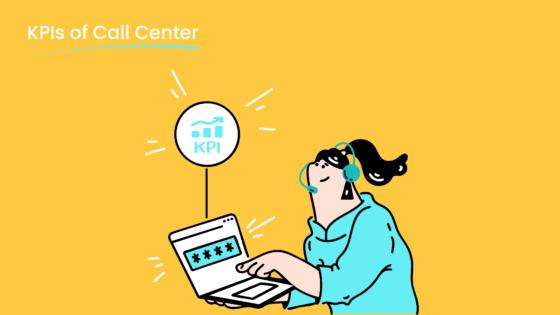
By focusing on these objectives, you can create a structured approach to call center call monitoring. Tools like Sobot’s Voice/Call Center simplify this process by offering features such as call tracking and analytics, enabling you to monitor metrics effectively and achieve continuous improvement.
Involve Agents in the Monitoring Process
Involving agents in the process fosters a culture of collaboration and transparency. When agents understand the purpose of monitoring and participate actively, they feel empowered rather than scrutinized. This approach improves their engagement and performance.
Monitoring call center metrics over time helps identify trends and areas that need attention. Consistent tracking enables data-driven decisions and allows managers to adjust strategies effectively to meet performance goals. Here’s how involving agents benefits your operations:
- Enhanced customer experience: Call monitoring helps identify service shortcomings and implement corrective actions, improving customer satisfaction.
- Agent performance improvement: Provides feedback for agents, allowing tailored coaching and enhancing their skills and confidence.
- Operational efficiency: Identifies inefficiencies and optimizes processes, reducing handle times and improving resource allocation.
Agents also benefit from specific metrics like QA scores, first contact resolution rates, and customer satisfaction scores. These metrics provide actionable insights that drive improvement. Sobot’s Voice/Call Center supports this process with features like real-time monitoring and unified workspaces, ensuring agents have the tools they need to succeed.
Leverage Analytics for Data-Driven Insights
Analytics are the backbone of modern call center monitoring. Advanced tools provide valuable insights and analytics that help you make informed decisions. By leveraging the right tools, you can identify patterns, predict trends, and optimize resources effectively.
Advanced analytics tools in call centers offer essential features that enhance call monitoring insights. These include automated quality management, which reviews all interactions to identify areas for improvement, and real-time agent assist that provides live support during calls. Comprehensive dashboards simplify the tracking of key performance indicators, while conversation intelligence uses AI to analyze interactions for valuable insights. Predictive analytics further enhances these capabilities by forecasting trends and optimizing resource allocation.
- Automated quality management reviews all interactions, identifying inefficiencies.
- Real-time agent assist provides live guidance during calls.
- Comprehensive dashboards track key performance indicators in one place.
- Conversation intelligence analyzes interactions for insights.
- Predictive analytics anticipates trends and optimizes resources.
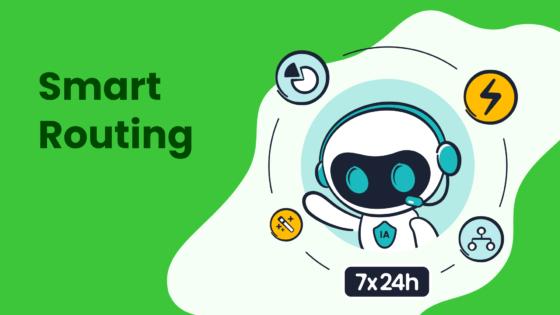
Sobot’s Voice/Call Center integrates these features seamlessly, enabling you to leverage analytics for continuous improvement. With tools like AI-powered voicebots and intelligent IVR, you can transform your call center monitoring practices into a strategic advantage.
Use Advanced Tools Like Sobot Voice/Call Center
Using advanced tools is one of the best practices for optimizing call center call monitoring. Tools like Sobot Voice/Call Center provide features that simplify monitoring and enhance performance. These tools allow you to analyze 100% of calls instead of relying on small samples, ensuring more reliable data and actionable insights. By leveraging the right tools, you can align monitoring goals with customer expectations, improving customer satisfaction and overall call center results.

Sobot Voice/Call Center offers intelligent IVR, real-time analytics, and AI-powered voicebots to streamline operations. Its unified workspace enables agents to manage calls efficiently while accessing customer information in one place. The platform’s monitoring and analysis capabilities allow you to track key metrics, such as first contact resolution rates and average handling times, ensuring continuous improvement.
With Sobot’s global number availability and encrypted data transfer, you can provide secure and seamless customer service across regions. The system’s 99.99% uptime ensures reliability, making it one of the best tools for call center call monitoring. By integrating Sobot Voice/Call Center into your operations, you can transform your call center into a hub of efficiency and customer satisfaction.
Establish a Feedback and Coaching Framework
A structured feedback and coaching framework is essential for continuous improvement in call center operations. Standardized evaluation forms help you identify areas needing improvement, enabling a focused coaching approach. Real-time feedback mechanisms allow agents to make immediate adjustments, boosting their confidence and performance.
Continuous improvement strategies foster a culture of development, leading to better customer satisfaction and reduced call handling times. For example:
- Standardized evaluation forms correlate with improved customer satisfaction scores.
- Real-time coaching based on monitoring data enhances agent responsiveness and training effectiveness.
- Structured feedback loops ensure consistent improvement in call center metrics.
Sobot Voice/Call Center supports these practices with features like real-time monitoring and analytics. Its unified workspace simplifies the coaching process by providing comprehensive data on agent performance. By integrating feedback with actionable insights, you can create a system that drives improvement and ensures your call center operates at its best.
Essential Tools and Technologies for Call Center Monitoring

Speech Analytics for Enhanced Insights
Speech analytics has revolutionized call center call monitoring by providing actionable insights from customer interactions. This technology analyzes call transcripts to identify patterns, trends, and areas for improvement. It helps you understand customer sentiment, detect recurring issues, and enhance communication strategies. By leveraging speech analytics, you can improve first contact resolution rates and ensure better call quality monitoring.
For example, analyzing transcripts can reveal pain points that hinder issue resolution during the first call. It also evaluates agent adherence to scripts and communication clarity, aiding in training and development. Additionally, speech analytics supports compliance monitoring by ensuring agents follow regulatory standards. This reduces legal risks and enhances overall performance.
| Performance Metric | Description |
|---|---|
| First Contact Resolution (FCR) | Analyzing transcripts helps identify pain points, improving issue resolution during the first call. |
| Call Quality | Evaluates agents on adherence to scripts and communication clarity, aiding in training and development. |
| Agent Performance | Provides insights into agent effectiveness, helping to identify top performers and training needs. |
| Compliance Monitoring | Real-time monitoring of adherence to regulatory standards, mitigating legal risks. |
| Sales Conversion Rates | Analyzes conversations to identify patterns that lead to successful sales outcomes. |
The growing adoption of AI-based technologies has further enhanced the capabilities of speech analytics. According to recent data, 80% of call centers now use AI technologies, and 70% of customer inquiries are handled without human intervention. This demonstrates the effectiveness of speech analytics in driving continuous improvement.
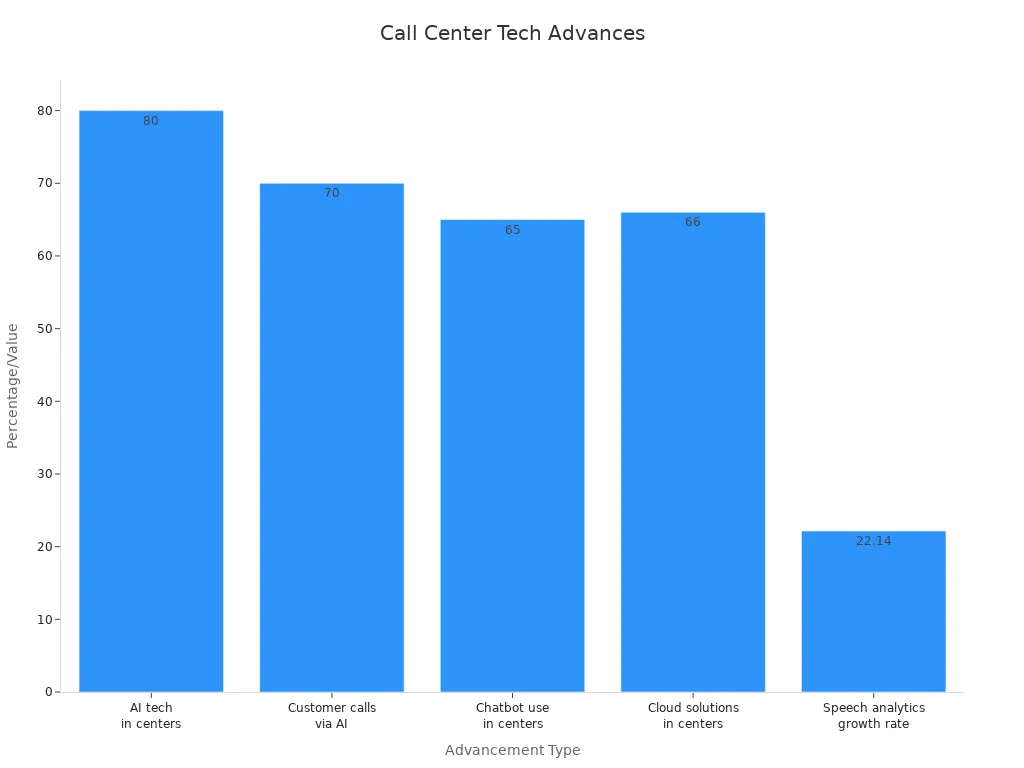
Real-Time Monitoring for Immediate Action
Real-time monitoring is a critical component of effective call center monitoring. It allows you to oversee live interactions, providing immediate insights into agent performance and customer experiences. This enables you to address issues as they arise, ensuring a seamless customer service experience.
With real-time monitoring, you can identify inefficiencies, such as long hold times or unresolved queries, and take corrective actions instantly. This improves operational efficiency and enhances customer satisfaction. For instance, real-time agent assist tools provide live guidance during calls, helping agents resolve issues more effectively. Comprehensive dashboards track key performance indicators, offering a clear view of call center operations.
The best call monitoring tools, like Sobot’s Voice/Call Center, integrate real-time monitoring with advanced analytics. These tools enable you to monitor calls live, analyze data, and implement changes that drive continuous improvement. By leveraging real-time monitoring, you can ensure that your call center operates at peak efficiency.
Quality Assurance Scorecards for Performance Tracking
Quality assurance scorecards are essential for tracking agent performance and ensuring consistent service quality. These scorecards provide a structured framework for evaluating calls, identifying areas for improvement, and facilitating targeted coaching. They eliminate bias by establishing objective evaluation standards, ensuring fairness in agent assessments.
| Pros | Description |
|---|---|
| Consistent, objective evaluation standards | Eliminates bias and ensures fairness in agent evaluations. |
| Identifies specific areas for agent improvement | Provides actionable insights for targeted coaching and training. |
| Creates measurable performance metrics | Tracks progress over time and demonstrates the impact of coaching efforts. |
| Facilitates data-driven coaching conversations | Provides concrete examples and data points to support feedback. |
| Helps track improvement over time | Monitors agent development and identifies ongoing training needs. |
Involving agents in the development of quality assurance scorecards boosts morale and fosters a culture of transparency. This clarity helps agents understand expectations and the importance of their communication skills. As a result, they feel more confident and motivated to improve their performance.
Quality assurance scorecards also support continuous improvement by tracking progress over time. They provide measurable metrics that demonstrate the impact of coaching efforts, helping you refine your strategies and achieve better results. Tools like Sobot’s Voice/Call Center simplify this process by offering real-time monitoring and analytics, ensuring your call center remains focused on delivering exceptional customer service.
How Sobot Voice/Call Center Supports Call Monitoring
Sobot Voice/Call Center offers a comprehensive solution to elevate your call center monitoring practices. Its advanced features and tools empower you to track, analyze, and improve every customer interaction. By integrating cutting-edge technology, Sobot ensures your call center operates efficiently while delivering exceptional customer experiences.
Advanced Features for Effective Monitoring
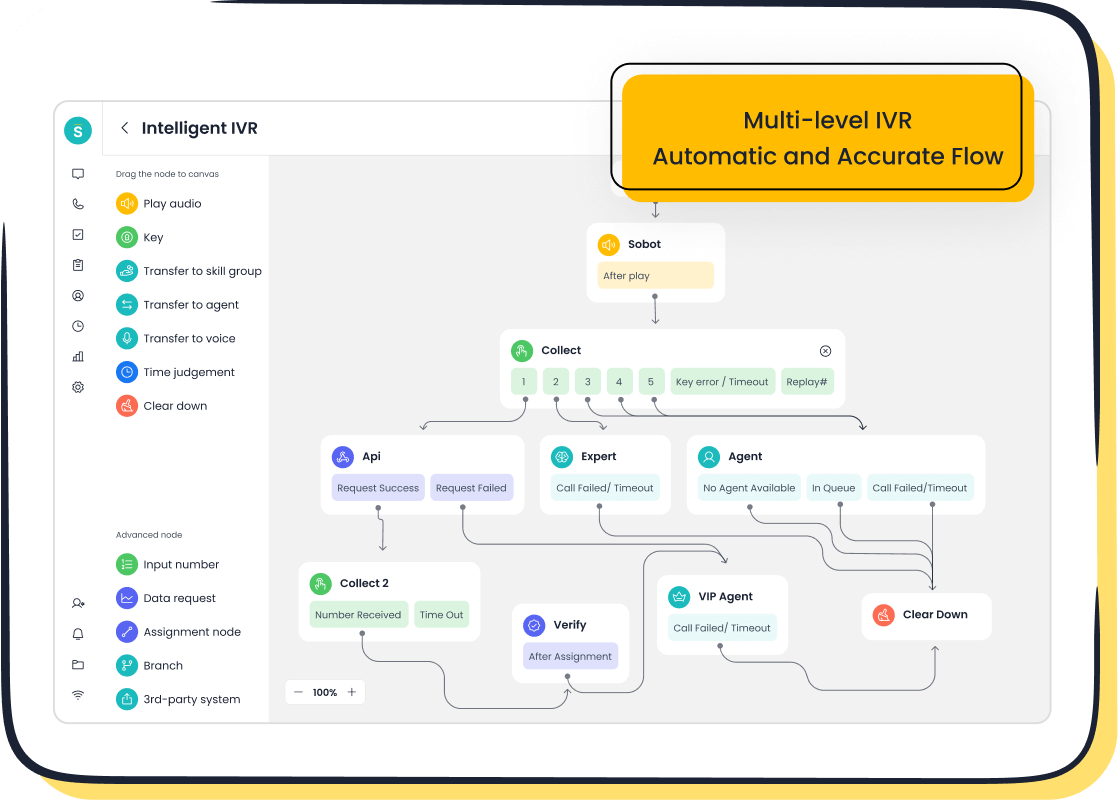
Sobot Voice/Call Center provides a suite of features designed to simplify call monitoring. These include intelligent IVR, real-time analytics, and AI-powered voicebots. Intelligent IVR allows you to customize call flows, ensuring customers reach the right agent quickly. Real-time analytics provide instant insights into agent performance and customer satisfaction, enabling you to make data-driven decisions. AI-powered voicebots handle repetitive tasks, freeing agents to focus on complex issues.
For example, the platform’s real-time monitoring capabilities allow you to oversee live calls and address issues immediately. This ensures consistent service quality and enhances customer satisfaction. Additionally, the unified workspace consolidates customer data, giving agents the tools they need to resolve inquiries efficiently.
Measurable Benefits of Sobot Voice/Call Center
Sobot Voice/Call Center delivers tangible results that improve both operational efficiency and customer satisfaction. The following table highlights some of the measurable benefits:
| Metric | Value |
|---|---|
| Reduction in inbound discussion | 20% |
| Positive feedback rate | 96% |
| Correct answers rate | 80% |
| Customer satisfaction rate | 95% |
| Self-service question resolution | 22.2% |
| CSAT score | 97% |
| Problem resolution rate | 85% |
| Customer happiness rate | 99% |
| Sign-off rate increase | 35% |
| COD collection rate increase | 40% |
These metrics demonstrate how Sobot’s tools enhance call center monitoring and drive better outcomes. For instance, the 97% CSAT score reflects the platform’s ability to meet customer expectations consistently.
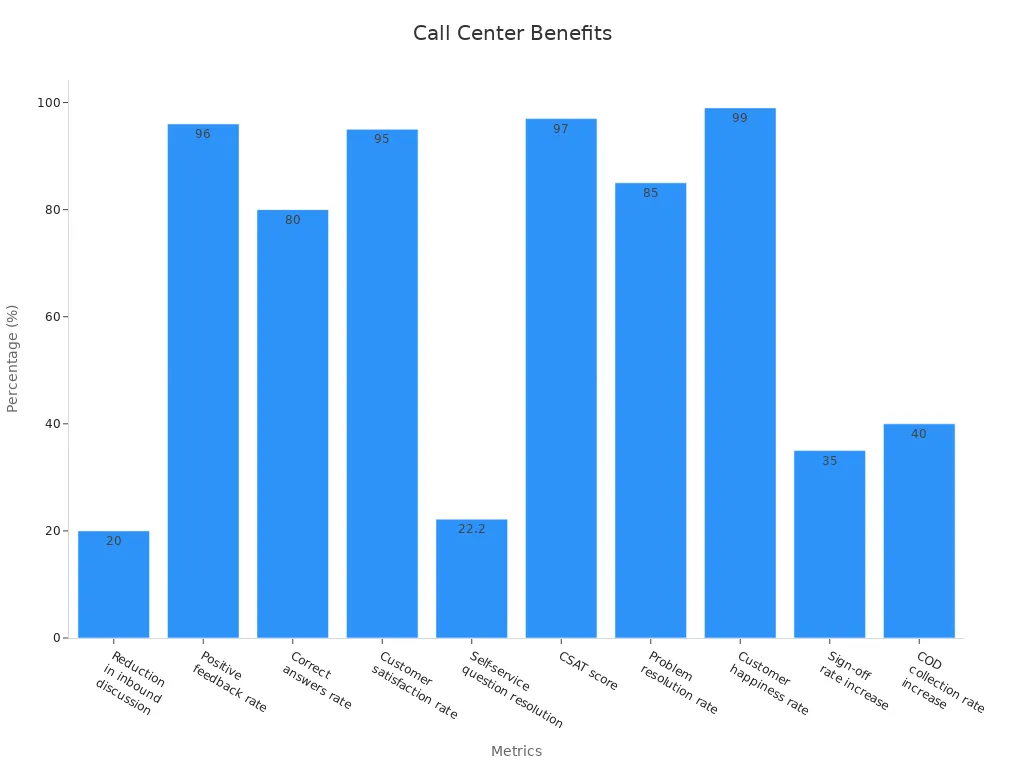
Why Choose Sobot for Call Center Monitoring?
Sobot Voice/Call Center stands out as a reliable and efficient solution for call center monitoring. Its 99.99% system uptime ensures uninterrupted operations, while global number availability supports businesses across regions. The platform’s encrypted data transfer guarantees security, making it a trusted choice for industries like finance, retail, and education.
By using Sobot’s call monitoring tools, you can achieve higher first contact resolution rates and reduce average handling times. These improvements not only enhance customer satisfaction but also boost agent productivity. With Sobot, you gain a partner committed to helping you deliver exceptional service.
Best Practices for Call Center Call Monitoring
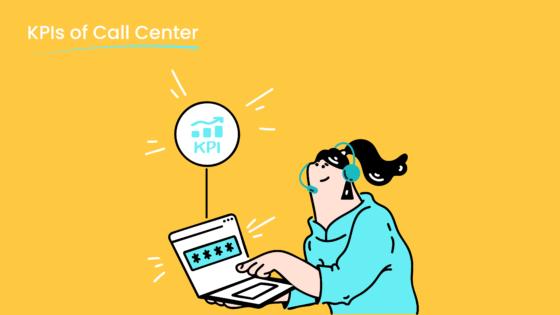
Foster a Transparent and Supportive Culture
Creating a transparent and supportive culture is one of the best practices for call center monitoring. When agents feel valued and trusted, they perform better and engage more deeply with their work. Transparent communication practices improve employee loyalty by 30% and reduce turnover by 40%. High-trust workplaces also achieve 50% higher productivity.
To foster this culture, emphasize monitoring as a developmental tool rather than a punitive measure. Share clear objectives and evaluation criteria with your team. Encourage open discussions about performance metrics and provide ongoing coaching. Use tools like Sobot Voice/Call Center to streamline processes and ensure agents have the resources they need to succeed.
Tip: Build trust by involving agents in the monitoring process. When agents understand the purpose of monitoring, they feel empowered to contribute to their own improvement.
Tailor Feedback to Individual Agent Needs
Personalized feedback drives improvement and enhances agent performance. AI tools analyze interactions to identify each agent’s strengths and areas for growth. Tailored feedback focuses on specific behaviors and provides actionable recommendations. This approach fosters a culture of continuous development within your team.
Use call monitoring data to deliver feedback that resonates with each agent. Highlight their achievements and offer constructive suggestions for improvement. For example, if an agent excels at resolving customer complaints, encourage them to share their techniques with colleagues. If another struggles with call handling times, provide targeted coaching to address this challenge.
Note: Personalized feedback not only boosts individual performance but also strengthens team dynamics. Agents feel supported and motivated to improve when feedback aligns with their unique needs.
Conduct Regular Quality Assurance Reviews
Regular quality assurance reviews ensure consistent service quality and identify areas for improvement. These reviews measure metrics like error rates, completeness scores, and update frequencies. For example:
| Metric Type | Description |
|---|---|
| Error Rates | Measures the frequency of errors in call handling. |
| Completeness Scores | Assesses the thoroughness of information provided. |
| Update Frequencies | Tracks how often data is refreshed or corrected. |
Consistent monitoring reinforces good habits and improves customer experience. Speech analytics plays a critical role in these reviews, enhancing satisfaction and operational efficiency. Use tools like Sobot Voice/Call Center to simplify the process. Its real-time monitoring and analytics capabilities help you track key metrics and implement changes that drive improvement.
Tip: Schedule quality assurance reviews regularly to maintain high standards and ensure your call center operates at peak efficiency.
Align Monitoring Goals with Business Objectives
Aligning your call monitoring goals with business objectives ensures that every effort contributes to the overall success of your organization. This alignment creates a clear connection between daily operations and long-term strategies, helping you achieve measurable results.
Strategic objectives act as a roadmap for your team. They provide a sense of purpose and guide employees toward achieving the organization's vision. When you align key performance indicators (KPIs) with these objectives, you ensure that all monitored aspects directly support your business goals. For example:
- KPIs like first contact resolution rates and customer satisfaction scores can reflect how well your call center meets customer expectations.
- Metrics such as average handling time and call quality can highlight areas for operational improvement.
By focusing on these KPIs, you can measure success effectively and optimize performance. This approach not only enhances agent productivity but also improves customer satisfaction.
Tip: Regularly review your KPIs to ensure they remain relevant to your evolving business objectives. Adjust them as needed to reflect changes in customer needs or market trends.
Using the best practices for call center call monitoring helps you maintain this alignment. Start by identifying the most critical metrics for your business. Then, use advanced tools like Sobot Voice/Call Center to track and analyze these metrics. Its real-time analytics and monitoring capabilities make it easier to align your goals with your strategic vision. This ensures that your call center operates efficiently while delivering the best possible customer experience.
When you align monitoring goals with business objectives, you create a unified approach that drives success. This alignment enhances performance metrics, streamlines operations, and ensures that your call center remains focused on achieving its best results.
Overcoming Challenges in Call Monitoring
Addressing Agent Resistance to Monitoring
Agent resistance often arises from fears of micromanagement or privacy invasion. This resistance can significantly reduce the effectiveness of call center monitoring. To overcome this, you need to focus on building trust and transparency. Explain the purpose of monitoring as a tool for growth rather than control. Highlight how it benefits agents by identifying areas for skill enhancement and recognizing their strengths.
Regular feedback and coaching sessions can also help reduce resistance. When agents see monitoring as a way to improve their performance and achieve personal growth, they are more likely to embrace it. For example, standardized procedures and consistent feedback create a supportive environment that fosters collaboration. This approach not only reduces turnover rates but also enhances overall team morale.
Balancing Monitoring with Privacy Concerns
Balancing monitoring needs with privacy concerns requires a thoughtful approach. Common concerns include the invasion of privacy, lack of consent, and potential misuse of data. Address these issues by implementing clear policies and obtaining explicit consent from agents. Transparency in how data is collected and used builds trust and ensures compliance with legal and ethical standards.
| Privacy Concern | Description |
|---|---|
| Invasion of Privacy | Monitoring tools should avoid encroaching on personal boundaries. |
| Lack of Consent | Always seek explicit consent before implementing monitoring practices. |
| Data Misuse | Protect personal data with robust security measures to prevent misuse. |
| Legal and Ethical Frameworks | Establish clear guidelines to balance privacy rights with monitoring needs. |
Using tools like Sobot Voice/Call Center ensures data security through encrypted transfers and compliance with global standards. This approach helps you maintain a balance between effective monitoring and respecting privacy.
Avoiding Over-Reliance on Technology
While technology enhances call center monitoring, over-reliance can lead to challenges. Algorithms may misinterpret data, resulting in inaccurate evaluations. Poor workload management can also occur if technology is not complemented by human oversight. To mitigate these risks, combine automated tools with regular human reviews.
| Risk Factors | Description |
|---|---|
| Inaccurate Algorithms | Algorithms may misinterpret data, leading to flawed evaluations. |
| Poor Workload Management | Over-reliance can result in uneven distribution of tasks among agents. |
Investing in flexible, modern solutions like Sobot Voice/Call Center minimizes technical glitches and ensures reliable performance. By blending technology with human expertise, you can achieve the best results in call center call monitoring.
Ensuring Consistency in Evaluation Standards
Consistency in evaluation standards ensures fairness and accuracy in call center call monitoring. When you apply uniform criteria, you create a reliable framework for assessing agent performance and improving customer satisfaction. This approach eliminates bias and provides actionable insights that drive continuous improvement.
To maintain consistency, focus on aligning evaluation standards with customer-centric criteria. For example, prioritize empathy and effective resolution during call assessments. These factors directly impact customer satisfaction and performance metrics. Quality assurance processes should also identify patterns in call types or agent behaviors that affect service outcomes. By addressing these patterns, you can refine training programs and enhance overall performance.
Key Benefits of Consistent Evaluation Standards
- Fair Assessments: Uniform criteria eliminate bias and ensure agents are evaluated objectively.
- Improved Training: Consistent monitoring highlights areas where agents need improvement, enabling targeted coaching.
- Enhanced Customer Satisfaction: Evaluations aligned with customer-centric criteria improve service quality and satisfaction.
Automated call monitoring software simplifies this process by providing detailed insights into agent performance. It scores calls based on various factors, revealing correlations with customer satisfaction. While results may not always align perfectly with satisfaction metrics, they are essential for identifying training needs and improving overall performance.
Steps to Ensure Consistency
- Define clear evaluation criteria that focus on empathy, resolution, and communication clarity.
- Use automated tools to standardize scoring and reduce human error.
- Regularly review evaluation standards to ensure they align with evolving customer expectations.
By implementing these steps, you create a structured approach to call center call monitoring. Tools like Sobot Voice/Call Center enhance this process with features like real-time analytics and quality assurance scorecards. These tools help you track performance metrics effectively and ensure consistent evaluations across your team.
Tip: Involve agents in the development of evaluation standards. When agents understand the criteria, they feel more confident and motivated to meet expectations.
Implementing a call monitoring system transforms your call center into a hub of efficiency and customer satisfaction. Clear objectives, advanced tools, and best practices ensure consistent service quality and measurable improvements. For instance, 76% of consumers prefer telephone communication for support, highlighting the importance of optimizing call center call monitoring. Additionally, 34% of callers abandon calls if not answered promptly, emphasizing the need for real-time monitoring tools.
Sobot’s Voice/Call Center offers the best solution for achieving these goals. Its intelligent IVR, real-time analytics, and AI-powered voicebots streamline operations and enhance customer experiences. With features like global number availability and encrypted data transfer, Sobot ensures secure and seamless service delivery.
Take the next step in improving your call center monitoring practices. Explore Sobot’s Voice/Call Center today and unlock the best results for your business.
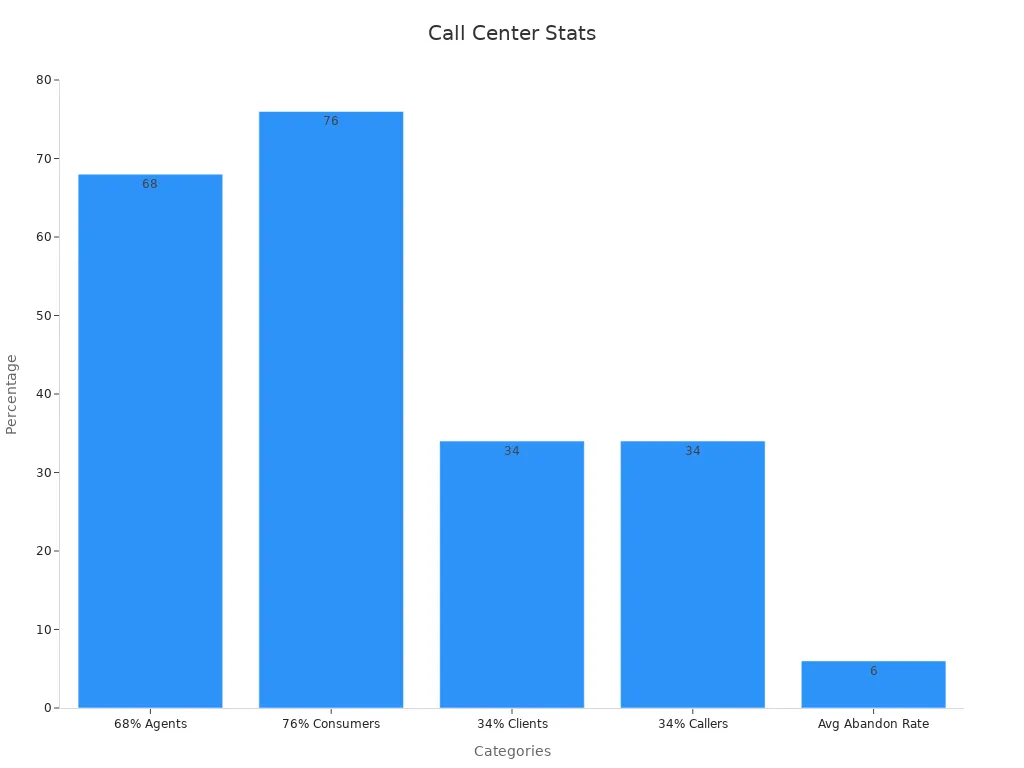
FAQ
What is the primary purpose of a call monitoring system?
A call monitoring system helps you evaluate customer interactions. It ensures quality service, tracks agent performance, and identifies areas for improvement. By using it, you can enhance customer satisfaction and operational efficiency.
How does Sobot Voice/Call Center improve call monitoring?
Sobot Voice/Call Center offers tools like real-time analytics, intelligent IVR, and AI-powered voicebots. These features simplify monitoring, provide actionable insights, and help you optimize agent performance. Its 99.99% uptime ensures reliable operations.
Can call monitoring systems ensure data security?
Yes, modern systems like Sobot Voice/Call Center use encrypted data transfer. This ensures secure communication and protects sensitive customer information. You can trust these tools to meet global security standards.
How do you involve agents in the monitoring process?
Share clear objectives and provide constructive feedback. Use monitoring data to highlight strengths and address weaknesses. Tools like Sobot’s unified workspace make it easier for agents to access insights and improve performance.
What metrics should you track during call monitoring?
Focus on metrics like first contact resolution, customer satisfaction scores, and average handling time. These indicators help you measure success and identify areas for improvement. Sobot’s analytics tools simplify tracking and analysis.
See Also
Enhancing Call Center Efficiency Through Effective Monitoring Techniques
Essential Strategies for Effective Call Center Quality Management
Understanding the Efficiency of Call Center Automation Processes
Key Features to Look for in CRM Call Center Solutions
Comprehensive Guide to Quality Assurance Tools for Call Centers
